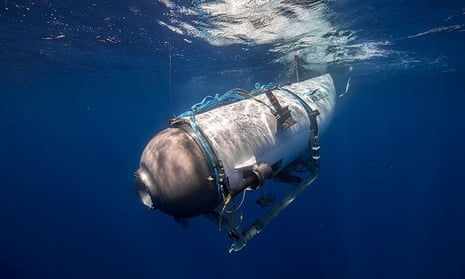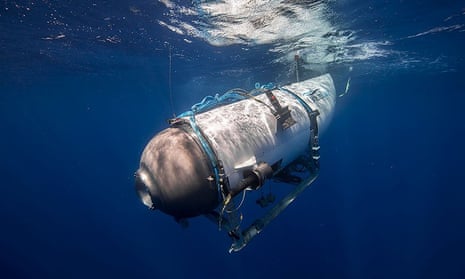Key events
Former Royal Navy submarine captain Ryan Ramsey said he thinks the five people onboard the submersible will have put the possible outcome of implosion to the back of their minds after the vessel had been on a number of trips to the Titanic wreckage already. He said:
I don’t think they will have gone down there thinking it was a possible outcome.
The submariners, for example, we all consider that and then you put it aside because you’re professional submariners and you go and do it, but you always know that it’s a possibility that something goes wrong.
You all go down together, do your work, and come back, or you don’t come back at all. Everybody knows that and that’s what they do when they join.
I doubt very much that any of them expected this outcome and I suspect they would have considered briefly but put it to the back of their minds because three trips had already been done down to the Titanic by that submersible.
Former Royal Navy submarine captain Ryan Ramsey has explained the possible reasons for the Titan submersible to implode on its descent to the Titanic wreckage. He told PA news agency:
There were probably two outcomes for this which is one, it’s lost communications and gone down to the bottom, and it’s stuck on the bottom.
The other one is that it lost communications and then suffered a catastrophic failure and imploded, which is what looks to be what happened.
“Either one of two things has happened. Either the hatch with the 17 bolts they used to seal them in has had a failure, which has then caused the hull to collapse at pressure because there’s huge amounts of pressure, even halfway down, or the pressure hull itself had a defect in it when they sailed and that’s fractured from the pressure, and caused the same result.
The only positive out of it is that it was instantaneous and they didn’t know anything.
Tributes have poured in for the five people who are now believed to have been instantly killed in a “catastrophic implosion” of the Titan submersible during its dive to the Titanic.
On Thursday, after days of aerial and underwater searches, a robotic diving vehicle deployed from a Canadian ship discovered a debris field from the submersible Titan on the seabed 1,600 feet (488 metres) from the bow of the Titanic.
Five major fragments of the 22-foot (6.7-metre) Titan were located in the debris field left from its disintegration, including the vessel’s tail cone and two sections of the pressure hull, Coast Guard officials said.
“The debris field here is consistent with a catastrophic implosion of the vehicle,” Rear Admiral John Mauger of the US coast guard said.
The Titan, operated by the US-based company OceanGate Expeditions, had been missing since it lost contact with its surface support ship on Sunday morning about an hour and 45 minutes into what should have been a two-hour dive to the world’s most famous shipwreck.
The White House said the loved ones of the five men had endured a “harrowing ordeal” over the past week.
For more on the reactions to this grim tragedy, read the full report by Guardian International’s site editor Graham Russell.
George Rutherglen, a professor of admiralty law at the University of Virginia said he would be surprised if the US government did not respond to the incident with more regulation, particularly given the resources deployed by the US Coast Guard.
These wrecks at the bottom of the sea have become more accessible with advancing technology. It doesn’t mean that it’s necessarily become safer to go down and take a look.
The International Maritime Organization, which regulates commercial shipping, could take some kind of action, he added, and Congress also could pass legislation. Nations such as the U.S. could, for example, block ships engaging in such expeditions from docking in their ports.
I would just be surprised if any incident with all of these costs involved — wrongful death, expensive rescue — would not lead to some initiatives.
But Forrest Booth, a San Francisco-based partner at Kennedys Law, said the International Maritime Organization “has no authority to impose its will” and was sceptical about how much change will follow.
There could be a move for states to adopt an international treaty on the deep ocean. But that will be resisted by some nations that want to do deep-sea mining, etc. I do not think much of substance will happen after the media attention of this event dies down.
– AP
Mike Reiss, a writer for “The Simpsons” television show who went on a Titanic expedition with OceanGate in 2022 has recalled how his waiver said he would be “subject to extreme pressure. And any failure of the vessel could cause severe injury or death.”
Speaking by memory Reiss recalled the terms said:
I will be exposed to risks associated with high pressure gases, pure oxygen, high voltage systems which could lead to injury, disability and death. If I am injured, I may not receive immediate medical attention.
The comments come amid speculation of the legal fall out from the incident and calls for more regulation of the industry.
– AP
The loss of the Titan submersible has raised questions about the regulation of deep-sea exploration.
Salvatore Mercogliano, a history professor at Campbell University in North Carolina who focuses on maritime history and policy compared deep-water operations as “akin to where aviation was in the early 20th century.”
Aviation was in its infancy — and it took accidents for decisions to be made to be put into laws.
There’ll be a time when you won’t think twice about getting on a submersible and going down 13,000 feet. But we’re not there yet.
Mercogliano said such operations are scrutinized less than the companies that launch people into space. In the Titan’s case, that’s in part because it operated in international waters, far from the reach of many laws of the United States or other nations.
The Titan wasn’t registered as a U.S. vessel or with international agencies that regulate safety, Mercogliano added. Nor was it classified by a maritime industry group that sets standards on matters such as hull construction.
Stockton Rush, the OceanGate CEO who died on Titan, previously said he thought regulation worked to impede innovation writing in a blog post on his company’s website that:.
Bringing an outside entity up to speed on every innovation before it is put into real-world testing is anathema to rapid innovation.
– AP
Opening Summary
Hello and welcome to the Guardian’s live coverage of the fate of the Titan submersible vessel that went missing during a dive down to the Titanic with five people onboard.
On Thursday the US Coast Guard confirmed the Titan suffered a “catastrophic implosion”, killing all onboard, and there are multiple reports that the US Navy picked up an underwater “anomaly” on its sensors that was probably the sound of that implosion, before any search equipment had been deployed. The navy passed that information to the Coast Guard, which continued its search because the navy did not consider the data to be definitive.
Filmmaker and deep-sea exploration veteran James Cameron said his sources reported similar information on Monday.
“We got confirmation within an hour that there had been a loud bang at the same time that the sub comms were lost. A loud bang on the hydrophone. Loss of transponder. Loss of comms. I knew what happened. The sub imploded,” Cameron told Reuters.
He said that he told colleagues in an email on Monday, “We’ve lost some friends,” and, “It’s on the bottom in pieces right now.”
Meanwhile, tributes have been paid to those aboard the submersible: British adventurer Hamish Harding, 58; French veteran Titanic explorer Paul Henri Nargeoloet, 77; British-Pakistani businessman Shahzada Dawood, 48, and his 19-year-old son Suleman; and 61-year-old American Stockton Rush, co-founder of OceanGate, the company that operated the lost sub.
The White House said the loved ones of the five men had endured a “harrowing ordeal” over the past week.
“Our hearts go out to the families and loved ones of those who lost their lives on the Titan,” it said in a statement. “They have been through a harrowing ordeal over the past few days, and we are keeping them in our thoughts and prayers.”
The family of Harding remembered a “dedicated father” who was “a guide, an inspiration, a support and a living legend” following the news of his death.
The friends and family of those killed also thanked those engaged in the search and paid respect to their loved ones. The families of the Dawoods said they were overwhelmed by the support they have received; Nargeoloet’s son remembered him as a larger than life figure and an aviation company operated by Harding’s family described him as a “larger than life figure”.
Officials have not confirmed whether they will be able to recover the bodies of the crew members but the Coast Guard is keeping some vessels in place to gather evidence while other personnel will be demobilised over the next 24 hours.

Join the exciting world of cryptocurrency trading with ByBit! As a new trader, you can benefit from a $10 bonus and up to $1,000 in rewards when you register using our referral link. With ByBit’s user-friendly platform and advanced trading tools, you can take advantage of cryptocurrency volatility and potentially make significant profits. Don’t miss this opportunity – sign up now and start trading!







Recent Comments